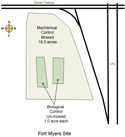Fort Myers
Natural area land managers and homeowners aren't the only people who struggle with melaleuca problems, but cattle ranchers--particularly on Florida's west coast--contend with melaleuca as a pasture weed. Melaleuca out competes forage grasses and, because cattle don't eat the tree, ranchers are forced to control the tree or lose their pastures. Annual or semi-annual mowing is a common method used to control melaleuca in pastures. However, many ranchers have noted that the biological control agents are severely stunting the melaleuca regrowth and they find that mowing is needed much less often, and in some cases, not at all. At this demonstration site, you can see how biological control is helping in this battle.
Chemical Treatments 
No chemical treatments were used
Mechanical Treatments 
Some years after invasion by melaleuca, property owners cut melaleuca trees near their bases and continued mowing the regrowth from the stumps on a yearly basis. Portions of the site continue to be mowed yearly while other sections are not to demonstrate the effects of biological control agents.
Biological Control Treatments 
Biological control agents were liberated to augment the existing population of both melaleuca weevil and psyllids. Insects are attacking the regrowth.
Mention of trade names or commercial products on this web site is solely for the purpose of providing specific information, and does not imply recommendation or endorsement by the U.S. Department of Agriculture, South Florida Water Management District, or University of Florida.
Demonstration Sites
- Lake Worth
- Prairie Pines
- Corkscrew
- Clewiston
- Holiday Park
- Fort Myers
- Fort Lauderdale
- Belle Meade
- Lee County


